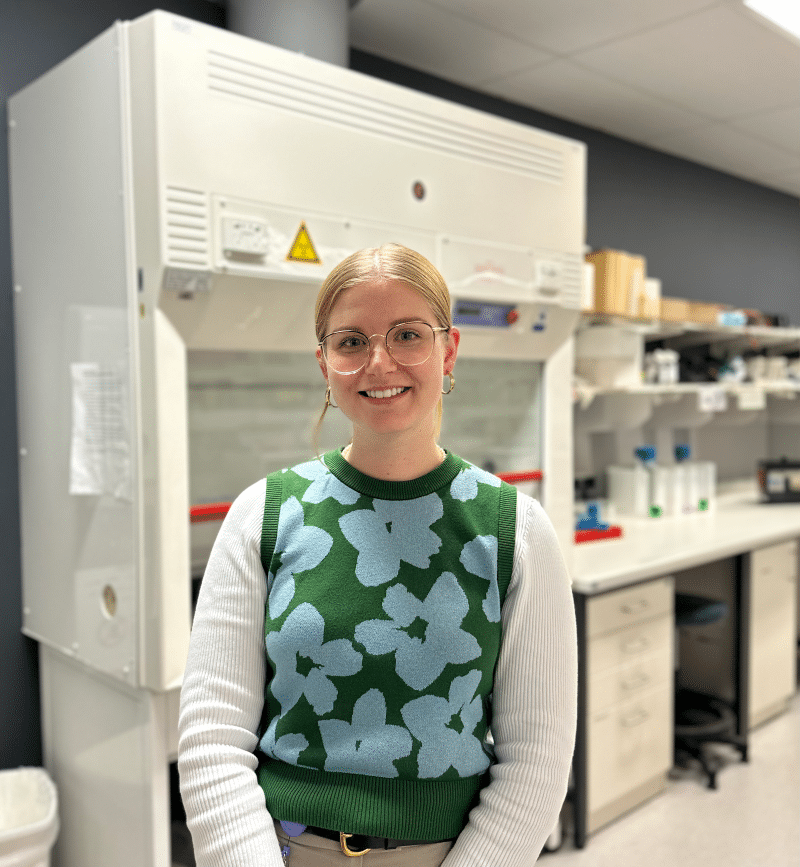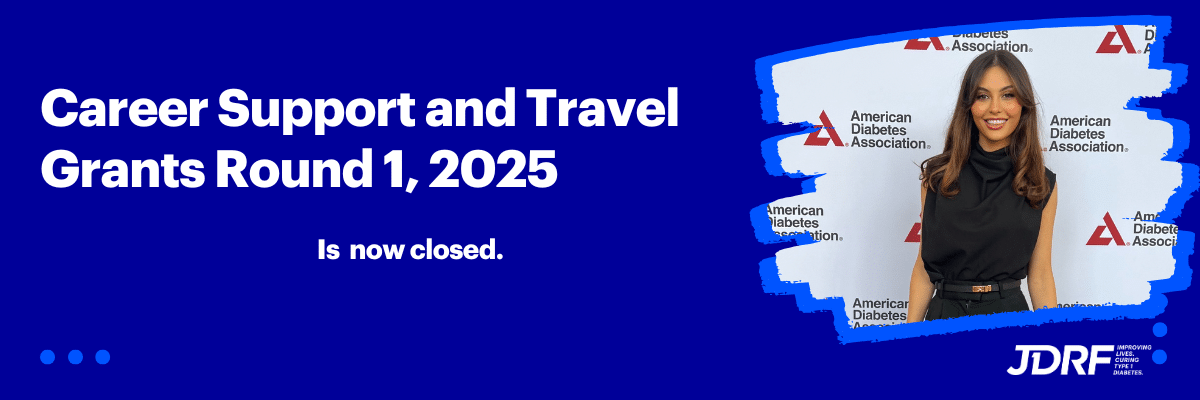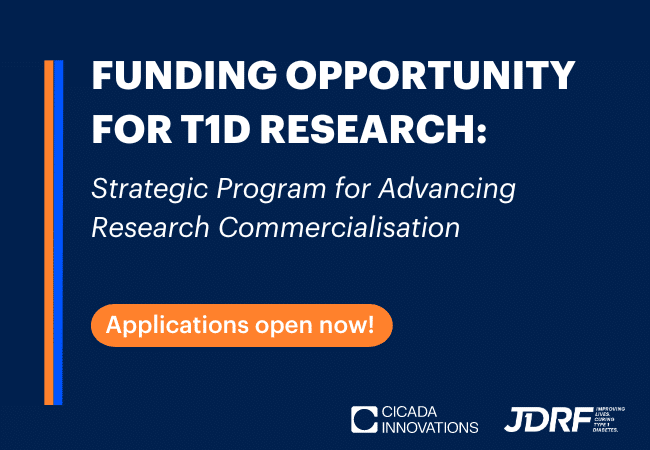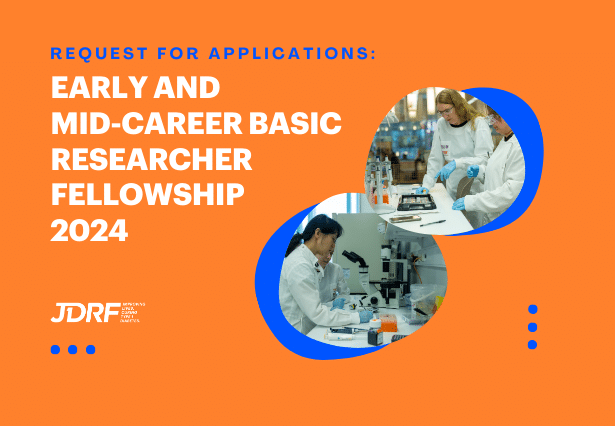Career Support and Travel Grants, Round 1, 2025 – is now closed.
Career Support and Travel Grants, Round 1, 2025 – is now closed.
Information for Applicants
It is expected that the next Travel Grants round will be in April 2025.
- Background
JDRF acknowledges the need to support excellence in research and clinical care in type 1 diabetes (T1D) through advancing the impact of T1D research in Australia.
The aims of the Career Support and Travel Grant are to support the next generation of T1D research and clinical care by enabling early- to mid-career researchers and allied health professionals to gain new skills, exchange knowledge, and establish connections and collaborations. Applicants will be able to apply for support for the purpose of furthering their researcher expertise in the area of T1D and enhancing their career development. This grant allows researchers to:
a) Participate in national and international conferences or scientific meetings.
b) Visiting a laboratory to undertake training in order to learn new skills and/or techniques with a host institution or an industry partner.
c) Participate in a short training course that enhances the researcher’s career development in the areas including, but not limited to:
- Research management
- Leadership and team management
- Grant writing
- Effective networking & communication with academic and non-academic audiences
- Media and presentation training
Applicants are encouraged to consult JDRF prior to submitting their application.
Please note: Oral presentations and travels incorporating lab visits or short training courses are considered a higher priority for funding.
- Applicant Categories
Applications submitted must fit into one of the following three (3) categories:
- Early-Career Basic and Clinician Researchers
This category is designed to support medical or science graduates in the early stages of their research careers. Applicants in this category must be current PhD students, or not more than 5 years post-PhD (as of the current Career Support and Travel Grant round deadline). Applicants must be committed to the mission of JDRF in finding cures and improving lives for those living with T1D, and need to demonstrate the relevance of their research in one of the following areas:
Artificial pancreas; complications; metabolic control; prevention; beta-cell regeneration; beta cell replacement; immunotherapies. Research outside these areas may be considered if they show a strong relevance to an unmet need in T1D research.
- Mid-Career Basic and Clinician Researchers
This category is designed to support mid-career medical or science researchers. Applicants in this category must be between 6- and 15-years post-PhD (as of the current Career Support and Travel Grant round deadline) and up to but not inclusive of an Associate Professor level. Applicants must be committed to the mission of JDRF to find cures and improve the lives of people living with T1D, and need to demonstrate the relevance of their research in one of the following areas:
Artificial pancreas; complications; metabolic control; prevention; beta-cell regeneration; beta cell replacement; immunotherapies. Research outside these areas may be considered if they show a strong relevance to an unmet need in T1D research.
- Allied-Health/Nursing Professionals
This category is designed to support allied health or nursing professionals, or students enrolled in a post-graduate program, whose work/research will impact the lives of people with T1D, their carers, and families. The applicant must be committed to the mission of JDRF to find cures and improve the lives of those with T1D.
The term ‘allied-health’ refers to health professionals usually considered part of the diabetes management team i.e., diabetes educators, dieticians, psychologists, social workers, and podiatrists. In addition, other allied health professionals who are considered relevant to the management of T1D such as exercise physiologists, occupational therapists, and pharmacists, will also be considered.
Allied health professionals should apply under this category only, irrespective of whether they are undertaking basic or clinical research.
- Funding
Expenses eligible for support include any business-related travel expenses consisting of conference registration, training course fees, visas, economy class airfare, airport and conference transfers, reasonably priced accommodation. Meal expenses are not eligible.
- Up to $1,000 for training and short courses
- Up to $2,000 for domestic travel within Australia
- Up to $4,000 for international travel
- Eligibility
Applicants must be:
- An early to mid-career researcher or an allied health professional as described in Section 2 ‘Applicant Categories’ above
- Undertaking research and/or working in an area relevant to T1D
- Affiliated with an Australian University or Institution
- Currently residing in Australia
- Presenting at a conference/scientific meeting, visiting a lab or participating in a short training course
- Attending between 1 November 2024 and 30 April 2025
- Engaged with Australian Diabetes research for more than 12 months, however if this does not apply, contact JDRF staff to discuss
- Applicants must not apply for two consecutive Career Support and Travel Grant rounds in any given calendar year
- Selection Criteria
Applications will be peer-reviewed by a panel based on the following criteria:
- Alignment of the applicant’s research with JDRF Research Strategy
- Scientific merit
- Relevance of travel and training with applicants’ research
- Applicant potential for career development
- Application Requirements
Relevant templates are available via online grants management system RMS360 (see Section 9. ‘Instructions’).
- An Application Form (use template) providing information on:
- Applicant Details
- Eligibility
- Travel Details
- Research Project
- Budget Details
- Bio-sketch (4 pages maximum, use template).
- Letter of Support (1 page maximum) from one supervisor commenting on your work, commitment to T1D research, and the scientific benefits of the travel.
- Evidence of Travel and Attendance
- Conferences: Please include submitted abstract, invitation to present and copy of registration. If abstract has not yet been submitted, please provide a draft abstract of the research that will be presented and notify JDRF immediately upon receiving confirmation of acceptance of your abstract.
- Lab visits: Please include a copy of the confirmation from the host institution to visit the lab.
- Training and short courses: Please include a copy of the course registration and acceptance.
JDRF may decline applications that do not meet any of the above requirements. Incomplete applications will NOT be accepted without prior discussion with JDRF staff.
- Reporting
If successful, applicants will be notified and will be sent a one-page report template that must be submitted within 4 weeks after all travel has been completed. Failure to submit the report within the timeframe may affect the eligibility of future applications.
- Reimbursement of funds
If your application is successful, payments are reimbursed after the travel, when all relevant evidence of travel and attendance are provided, and the report submitted is approved by JDRF. Inability to do so will lead to your application being rescinded.
- Instructions
Applications must be submitted online using JDRF’s online grants management system RMS360. RMS360 Instructions and FAQs are available in the system. Please contact JDRF Staff if you require assistance.
Information submitted as part of the application is collected and stored in accordance with the JDRF Australia’s Privacy Policy.
JDRF will only consider complete applications that meet application requirements as required in the templates provided in RMS360. Scanned documents are not acceptable.
A submission is complete if:
- It includes all the documents listed in the submission checklist below.
- All mandatory fields in RMS360 are complete.
- Submission Checklist
| Item | TEMPLATE PROVIDED | INSTRUCTIONS FOR RMS36 |
|---|---|---|
| ☐ Application Form | Yes | Upload in “Research Plan Upload - Letter of Intent” tab, prior to submission. |
| ☐ Bio-sketch | Yes | Upload into your researcher profile, prior to submission. The bio-sketch from your profile will automatically append itself to your application. |
| ☐ Evidence of Travel and Attendance | No | Upload in “Additional Attachments” tab, prior to submission. |
| ☐ Letter of Support | No | Upload in “Additional Attachments” tab, prior to submission. |
11. Contacts
If you have enquiries please consult:
Serena Radano
Grants Administration Officer
JDRF Australia
P: (02) 8364 0243
E: [email protected]
Other Available Grants

PhD Top-Up Scholarship 2025
JDRF Australia is dedicated to advancing cutting-edge research in Type 1 Diabetes (T1D), with a strong emphasis on nurturing the development of talented emerging researchers in the field. JDRF Australia is inviting applications for the PhD Top-up Scholarship. The Scholarship is designed to support and encourage PhD students pursuing research in the field of T1D in line with JDRF’s mission – to treat, prevent and cure T1D.
Learn more


